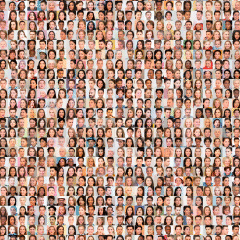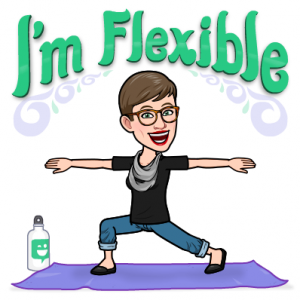
Artificial intelligence (AI) isn’t coming. It’s here.
These are AI-generated faces. She could be a model for a Pantene commercial. She’s flawless. She’s fake.
Humans are being replaced by AI in companies all around the world. In roles that are customer service and administration based. In sales, finance and banking organisations, AI is doing the work a human used to do.
These are among some of the roles that are already being superseded by a computer.
- Customer service and help desk representatives
- Bookkeepers and accountants
- Receptionists
- Couriers
- Proofreaders and fact-checkers
- Market research analysts
- Advertising sales
- Telemarketer sales
- Security guards
There are others. And, there will be more.
Fear not, m’luv, all is not lost
This causes a lot of people to feel afraid for the future, but I’m hoping you can hear the optimism in my words when I say, no, this is exciting, this is a time unlike any other when humans are being given a unique opportunity to be better humans!
Be a better human
The job market now has a new division of labour between automated employment and human employment.
Look upon work that machines can do in a new, innovative way. Rather than cry poor-me, begin to plan for how you can educate yourself into the type of work machines will never be able to do, work that demands advanced human-to-human interaction.
Jobs that will be less susceptible to being automated will require complex human interactions, advanced problem-solving, critical thinking, imagination, creativity, education, communication (that goes beyond the predictable), advanced healthcare, strategic thinking and planning, storytelling and the Arts, product innovation and design. This list is of course not exhaustive. I am excited though, thinking of the potential for jobs we cannot even conceive of right now.
 Human employment will be worth more because it’ll become a highly valued commodity. It will require skills only humans can obtain therefore it will produce work that’s more meaningful and societally more beneficial.
Human employment will be worth more because it’ll become a highly valued commodity. It will require skills only humans can obtain therefore it will produce work that’s more meaningful and societally more beneficial.
This is the first time in history each of us has a significant and important reason for being a better person. Nicer. Kinder. Considerate. Compassionate. Empathetic.
We absolutely have to work to improve who we are as individual people because it will be in our ability to get along harmonically that will withstand the tests that the increased reliance on artificial intelligence will bring our society.
Human employment requires high emotional intelligence
Let’s get the theory of emotional intelligence out of the way, shall we?
Emotional intelligence describes an ability or capacity to perceive, assess and manage the emotions of one’s self and of others. It reflects your ability to monitor your own and other’s feelings and emotions to discriminate among them and to use this information to guide your thinking and actions (source).
Improve your emotional intelligence and it will make you a better human.
Emotional intelligence involves how you perceive yourself – that is, how well you understand yourself, whether you’re living a meaningful life and have self-awareness. It is how you express yourself – are you comfortable expressing your feelings and thoughts verbally and non-verbally? Are you assertive and clear in communicating your needs in a respectful, diplomatic way? Are you independently capable of completing tasks autonomous of others?
When you begin to study your emotional intelligence, you begin to advance your skills for relating to other people, you’re able to develop and maintain relationships that are founded in trust and compassion. Your empathy for others will increase, as will your social responsibility.
You’ll care more about your peers, friends, social networks, neighbours, community, environment and society as a whole.
Actively working to improve your emotional intelligence will increase your ability to solve difficult problems, you’ll be able to remain objective and see things as they really are. You’ll also gain greater control on your impulses to react or respond automatically. So, yes, this means, not buying another pair of shoes just because they’re on sale (and yep, I’m looking in the mirror right now).

Here’s my favourite aspect of learning more about my emotional intelligence – my stress has reduced. That’s right, I’m better capable of managing my stress. I’m more tolerant. I’m able to appreciate stress for what it’s teaching me. I’m more flexible and can cope with unpredictable circumstances. And if this article is testament I’m also a lot more optimistic and hopeful in the face of challenges.
In a practical sense, emotional intelligence is what makes us human.
Machines will never, no matter how well their algorithms are designed, have the capacity to feel emotions naturally. Emotions are generated by our brains. Emotions serve to store our memories and create our imagination. Nothing will ever replace that.
This poses a fantastic opportunity for the human race to improve itself.
No longer do we need to use our brains for mundane tasks. Now, we have the opportunity to focus on things that make us unique and interesting, complex and incredibly intelligent. We can use the power of our brains for things greater than what to have for dinner and what clothes to wear. Leave that to AI to decide for us.
Let us instead harness the power of the machine between our ears to solve global problems on a local level that require caring about each other, collaborating with each other and communicating our imagination and innovation to each other.
Are you artificial intelligence proof?
We have for too long looked at artificial intelligence as taking our jobs but technologies have always come along to change employment.
Electricity replaced candles. Candle-makers coped.
Cars put horse and buggy mechanics out of business. They survived.
Mobile phones changed the landscape of telecommunications employment. Those employees upskilled.
The Internet changed fucking everything. And, whoa, no surprise, we’re still bloody here.
 The reality is, AI isn’t going to take your job if you choose to see the writing that’s written in plain-as-pink-paint on the walls. If you work in an industry that will make your role redundant, you have a responsibility to upskill yourself.
The reality is, AI isn’t going to take your job if you choose to see the writing that’s written in plain-as-pink-paint on the walls. If you work in an industry that will make your role redundant, you have a responsibility to upskill yourself.
It is not your employer’s responsibility, it’s yours.
There’s a reason I specialise in emotional intelligence, mental wellbeing and communication. I saw this trend coming so I prepared myself. I increased my skills in these three areas because these topics interest me. I could’ve been interested in creative design or screenwriting or drama and if so, I would’ve upskilled in those areas.
If you want to remain employable, you need to look at what you love and combine that will what cannot be replaced by a machine. And if that’s too formidable a task right now, start with increasing your emotional intelligence and the answers will come as you become more self-aware and connected with the collective consciousness of the human employment landscape.
And, lucky you, you can start straight away!
 I am running lunchtime learning sessions in the coming weeks on Practical Emotional Intelligence for Beginners.
I am running lunchtime learning sessions in the coming weeks on Practical Emotional Intelligence for Beginners.
Register here:
- Melbourne CBD – Monday, 2nd December, 1- 2 pm
- Melton – Wednesday 4th December, 1-2 pm
- Webinar – 9th December – 1-2 pm
Your coach,
![]()
P.s Did someone share this blog post with you? Or did you find it online through your ingenious search talents?
I recommend you join my newsletter mailing list to stay in the loop of the journey of personal development that I’ll take you on. My newsletter is a mixed bag of insights and personal stories with educational resources on the topics of emotional intelligence, mental wellbeing and communication.
You’ll be the first to hear of new workshops, webinars, online courses and speaking gigs, and of course, you’ll get mates rates on all paid-for services. You can join the list here.
Don’t want to join but still want to follow my work? That’s cool.
You can…
- Connect with me on LinkedIn
- Follow me on Instagram where most of my content will feed into posts, stories and IGTV.
- And Facebook, which I’m really active on. I won’t ‘friend’ you unless we’ve met in person, but you can follow me, I post a bunch of stuff publicly.
- And there’s Twitter, which admittedly I’m not very active on.
- You can also subscribe to my YouTube channel.
See you on the inside m’luv.
Gratitude++


